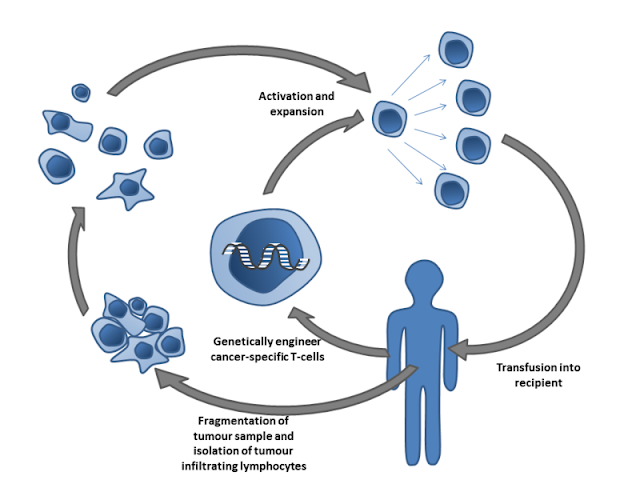𝑪𝒂𝒏𝒄𝒆𝒓 𝒊𝒎𝒎𝒖𝒏𝒐𝒕𝒉𝒆𝒓𝒂𝒑𝒊𝒆𝒔 𝒄𝒂𝒏 𝒃𝒆 𝒄𝒍𝒂𝒔𝒔𝒊𝒇𝒊𝒆𝒅 𝒊𝒏𝒕𝒐 𝒔𝒆𝒗𝒆𝒓𝒂𝒍 𝒄𝒂𝒕𝒆𝒈𝒐𝒓𝒊𝒆𝒔 𝒃𝒂𝒔𝒆𝒅 𝒐𝒏 𝒕𝒉𝒆𝒊𝒓 𝒎𝒆𝒄𝒉𝒂𝒏𝒊𝒔𝒎𝒔 𝒐𝒇 𝒂𝒄𝒕𝒊𝒐𝒏 𝒂𝒏𝒅 𝒕𝒂𝒓𝒈𝒆𝒕𝒔. 𝑯𝒆𝒓𝒆 𝒂𝒓𝒆 𝒔𝒐𝒎𝒆 𝒄𝒐𝒎𝒎𝒐𝒏 𝒄𝒍𝒂𝒔𝒔𝒊𝒇𝒊𝒄𝒂𝒕𝒊𝒐𝒏𝒔 𝒐𝒇 𝒄𝒂𝒏𝒄𝒆𝒓 𝒊𝒎𝒎𝒖𝒏𝒐𝒕𝒉𝒆𝒓𝒂𝒑𝒊𝒆𝒔:
C𝐡𝐞𝐜𝐤𝐩𝐨𝐢𝐧𝐭 𝐢𝐧𝐡𝐢𝐛𝐢𝐭𝐨𝐫𝐬:
These drugs target molecules known as immune checkpoints, which are proteins that regulate the activity of immune cells. By blocking these checkpoints, checkpoint inhibitors help to unleash the immune system's response against cancer cells. Examples include drugs like pembrolizumab (Keytruda) and nivolumab (Opdivo).
Opdivo (nivolumab) and Keytruda (pembrolizumab) are two immunotherapy drugs used to treat a number of different types of cancer. They are monoclonal antibodies that have similar efficacy and safety profiles and are both programmed death receptor-1 (PD1) inhibitors, which were first approved in the US in 2014.
𝐂𝐀𝐑-𝐓 𝐜𝐞𝐥𝐥 𝐭𝐡𝐞𝐫𝐚𝐩𝐲:
Chimeric Antigen Receptor T-cell therapy (CAR-T) involves modifying a patient's own T cells in the laboratory to express chimeric antigen receptors (CARs) that can recognize and bind to specific proteins on cancer cells. The modified CAR-T cells are then infused back into the patient, where they can target and kill cancer cells.
𝐓𝐮𝐦𝐨𝐫-𝐢𝐧𝐟𝐢𝐥𝐭𝐫𝐚𝐭𝐢𝐧𝐠 𝐥𝐲𝐦𝐩𝐡𝐨𝐜𝐲𝐭𝐞 (𝐓𝐈𝐋) 𝐭𝐡𝐞𝐫𝐚𝐩𝐲:
𝐓𝐮𝐦𝐨𝐫-𝐢𝐧𝐟𝐢𝐥𝐭𝐫𝐚𝐭𝐢𝐧𝐠 𝐥𝐲𝐦𝐩𝐡𝐨𝐜𝐲𝐭𝐞 (𝐓𝐈𝐋) 𝐭𝐡𝐞𝐫𝐚𝐩𝐲:
This approach involves isolating immune cells, known as Tumor-infiltrating lymphocytes (TILs), from a patient's tumor. The TILs are then expanded and activated in the laboratory before being reinfused into the patient.
𝐌𝐨𝐧𝐨𝐜𝐥𝐨𝐧𝐚𝐥 𝐚𝐧𝐭𝐢𝐛𝐨𝐝𝐢𝐞𝐬:
𝐌𝐨𝐧𝐨𝐜𝐥𝐨𝐧𝐚𝐥 𝐚𝐧𝐭𝐢𝐛𝐨𝐝𝐢𝐞𝐬:
These are laboratory-produced antibodies designed to target specific proteins on cancer cells. Monoclonal antibodies can work by directly attacking cancer cells, blocking growth signals, or triggering immune responses against cancer. Examples include drugs like rituximab (Rituxan), trastuzumab (Herceptin), and cetuximab (Erbitux).
These drugs aim to modulate the immune system to enhance its ability to recognize and attack cancer cells. They can include cytokines, such as interferons and interleukins, which help stimulate immune responses. Other immune system modulators include immune stimulatory agents like talimogene laherparepvec (T-VEC), an oncolytic virus therapy.
𝐓𝐡𝐞𝐫𝐚𝐩𝐞𝐮𝐭𝐢𝐜 𝐯𝐚𝐜𝐜𝐢𝐧𝐞𝐬:
𝐓𝐡𝐞𝐫𝐚𝐩𝐞𝐮𝐭𝐢𝐜 𝐯𝐚𝐜𝐜𝐢𝐧𝐞𝐬:
These vaccines are designed to stimulate the immune system to recognize and attack cancer cells. Unlike preventive vaccines that aim to prevent infections, therapeutic vaccines are used in patients who already have cancer. They can include tumor-specific antigens or whole tumor cells, along with immune stimulants to enhance the immune response.










No comments:
Post a Comment